Boweman Surname Ancestry ResultsOur indexes 1000-1999 include entries for the spelling 'boweman'. In the period you have requested, we have the following 17 records (displaying 1 to 10): Buy all | | | Get all 17 records to view, to save and print for £72.00 |
These sample scans are from the original record. You will get scans of the full pages or articles where the surname you searched for has been found. Your web browser may prevent the sample windows from opening; in this case please change your browser settings to allow pop-up windows from this site. Inhabitants of Norwich
(1307-1341)
This calendar of the deeds enrolled from 1307 to 1341 was compiled for the corporation by Edith Crosse (MacKinnon), indexed by Walter Rye, and published by the Norfolk and Norwich Archaeological Society in 1915. They are set out chronologically, translated from the original Latin into English, giving the name and occupation of grantor and grantee, and naming the parish in which the property lay. Precise dates are not given, just the regnal year.BOWEMAN. Cost: £4.00.  | Sample scan, click to enlarge
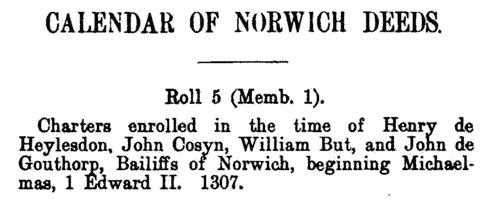
| Fine Rolls (1452)
The fine rolls of the 31st year of the reign of king Henry VI record part of the government administration in England, with orders sent out day by day to individual officers, and commitment of particular responsibilities and duties. There is also some material relating to Wales, Scotland, Ireland and the English possessions in France.
BOWEMAN. Cost: £8.00.  | Sample scan, click to enlarge
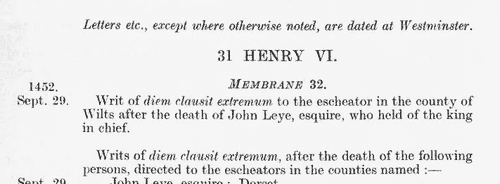
| Close Rolls
(1447-1454)
The close rolls of the 26th to 32nd years of the reign of king Henry VI record the main artery of government administration in England, the orders sent out day by day to individual officers, especially sheriffs of shires: they are an exceptionally rich source for so early a period. There is also some material relating to Wales, Scotland, Ireland and the English possessions in France. BOWEMAN. Cost: £4.00.  | Sample scan, click to enlarge

| The English in France
(1457)
King Henry VI of England (one of the grandsons of Charles VI of France) claimed the throne of France (and quartered the fleurs-de-lis of France with the lions of England on the royal standard) as had his predecessors since Edward III, as descendants of Philip IV of France. The English had real power or influence in Brittany, Normandy, Flanders and Gascony, and actual possession of several coastal garrisons, in particular Calais, where the French inhabitants had been replaced by English. Henry VI came to the throne only seven years after his father had trounced the French at Agincourt; but his cousin, Charles VII, who became king of France in the same year, spent his long reign rebutting the English king's claim to his throne by territorial reconquest and consolidation. The English administration kept a series of records called the French Rolls. On these are recorded royal appointments and commissions in France; letters of protection and safe-conduct to soldiers, merchants, diplomats and pilgrims travelling to France from England and returning, and to foreign legations. There are also licences to merchants to export to the Continent, and to captains to transport pilgrims. As Henry VI's reign progressed, and the English grip on northern France loosened, the French Rolls also increasingly include entries concerning the ransoming of English prisoners.BOWEMAN. Cost: £6.00.  | Sample scan, click to enlarge
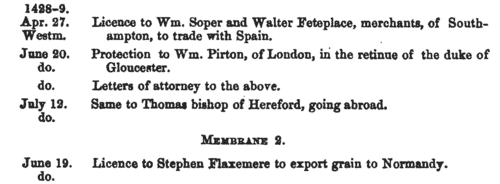
| The English in France
(1459)
King Henry VI of England (one of the grandsons of Charles VI of France) claimed the throne of France (and quartered the fleurs-de-lis of France with the lions of England on the royal standard) as had his predecessors since Edward III, as descendants of Philip IV of France. The English had real power or influence in Brittany, Normandy, Flanders and Gascony, and actual possession of several coastal garrisons, in particular Calais, where the French inhabitants had been replaced by English. Henry VI came to the throne only seven years after his father had trounced the French at Agincourt; but his cousin, Charles VII, who became king of France in the same year, spent his long reign rebutting the English king's claim to his throne by territorial reconquest and consolidation. The English administration kept a series of records called the French Rolls. On these are recorded royal appointments and commissions in France; letters of protection and safe-conduct to soldiers, merchants, diplomats and pilgrims travelling to France from England and returning, and to foreign legations. There are also licences to merchants to export to the Continent, and to captains to transport pilgrims. As Henry VI's reign progressed, and the English grip on northern France loosened, the French Rolls also increasingly include entries concerning the ransoming of English prisoners.BOWEMAN. Cost: £6.00.  | Sample scan, click to enlarge
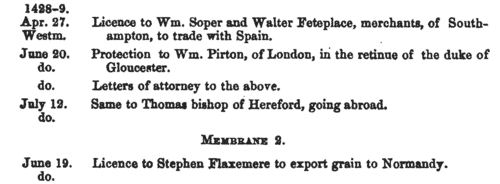
| The English in France
(1460)
King Henry VI of England (one of the grandsons of Charles VI of France) claimed the throne of France (and quartered the fleurs-de-lis of France with the lions of England on the royal standard) as had his predecessors since Edward III, as descendants of Philip IV of France. The English had real power or influence in Brittany, Normandy, Flanders and Gascony, and actual possession of several coastal garrisons, in particular Calais, where the French inhabitants had been replaced by English. Henry VI came to the throne only seven years after his father had trounced the French at Agincourt; but his cousin, Charles VII, who became king of France in the same year, spent his long reign rebutting the English king's claim to his throne by territorial reconquest and consolidation. The English administration kept a series of records called the French Rolls. On these are recorded royal appointments and commissions in France; letters of protection and safe-conduct to soldiers, merchants, diplomats and pilgrims travelling to France from England and returning, and to foreign legations. There are also licences to merchants to export to the Continent, and to captains to transport pilgrims. As Henry VI's reign progressed, and the English grip on northern France loosened, the French Rolls also increasingly include entries concerning the ransoming of English prisoners.BOWEMAN. Cost: £6.00.  | Sample scan, click to enlarge
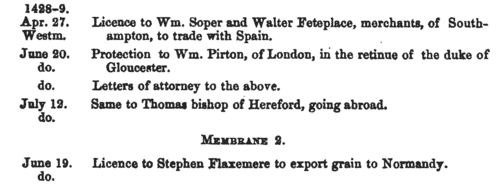
| Aliens in East Smithfield (1571)
From a general census of the 1972 aliens living in and about London, recorded in ff. 395-432 of State Papers Domestic, Elizabeth, volume 84.
BOWEMAN. Cost: £8.00.  | Sample scan, click to enlarge

| Yorkshire Feet of Fines
(1571-1584)
Pedes Finium - law suits, or pretended suits, putting on record the ownership of land in YorkshireBOWEMAN. Cost: £4.00.  | Sample scan, click to enlarge

| Wandsworth Burials
(1649)
The ancient parish of Wandsworth in Surrey comprised the single township of Wandsworth, including the hamlets of Garratt, Half Farthing and Summers Town. It lay in the archdeaconry of Surrey of the diocese of Winchester: unfortunately, few bishop's transcripts of Surrey parish registers survive earlier than 1800. Although the original parish registers of Wandsworth doubtless commenced in 1538, the volume(s) before 1603 had been lost by the 19th century. In 1889 a careful transcript by John Traviss Squire of the first three surviving registers was printed, and we have now indexed it year by year. The early burial registers contain little detail - date of burial, and full name. For the burial of children, the father's name is also stated; for the burial of wives, the husband's. Such details as date or cause of death, age, address or occupation are almost never given. On the other hand, the Wandsworth burial registers of the early 17th century are particularly important because they contain the names of adults born well back into the 16th century, a period for which the parish registers no longer survive. Moreover, the burial registers are considerably more bulky than the baptism registers, because the burying ground was used by Dissenters, who formed a large part of the population. BOWEMAN. Cost: £4.00.  | Sample scan, click to enlarge
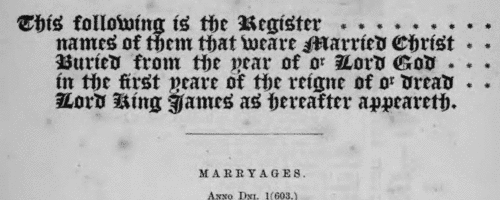
| Wandsworth Baptisms
(1652)
The ancient parish of Wandsworth in Surrey comprised the single township of Wandsworth, including the hamlets of Garratt, Half Farthing and Summers Town. It lay in the archdeaconry of Surrey of the diocese of Winchester: unfortunately, few bishop's transcripts of Surrey parish registers survive earlier than 1800. Although the original parish registers of Wandsworth doubtless commenced in 1538, the volume(s) before 1603 had been lost by the 19th century. In 1889 a careful transcript by John Traviss Squire of the first three surviving registers was printed, and we have now indexed it year by year. The baptism registers from 1603 to 1726 normally give date of baptism, and the names of the child and its father, but do not give date of birth or the mother's christian name.BOWEMAN. Cost: £2.00.  | Sample scan, click to enlarge
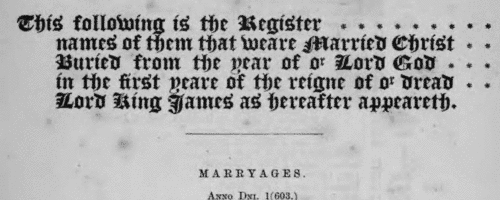
|
| 1 | 2 |  |
Research your ancestry, family history, genealogy and one-name study by direct access to original records and archives indexed by surname.
|












